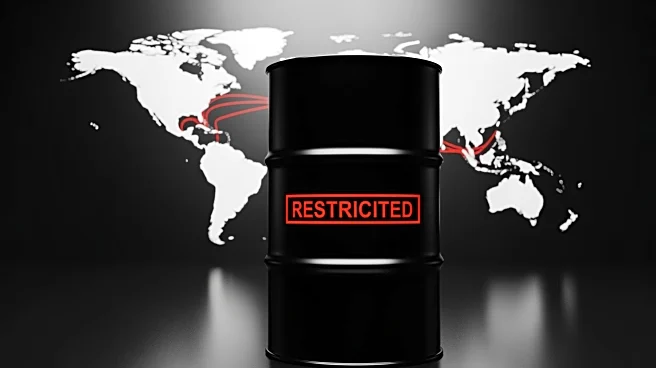What's Happening?
Recent US sanctions targeting Russia's major oil exporters, Rosneft and Lukoil, have led to a significant decline in Russia's seaborne crude shipments. The sanctions, imposed on October 22, have caused
shipments to fall to 3.58 million barrels per day, marking the sharpest decline since January 2024. This has resulted in a floating oil glut, with 380 million barrels now trapped at sea, unable to generate immediate revenue for Russia. Major buyers such as China, India, and Türkiye have reduced their purchases, fearing secondary sanctions. China's state-owned companies, Sinopec and PetroChina, have canceled Russian cargoes, while India's state-run refiners have paused purchases. Türkiye has also cut its imports, seeking alternative supplies from other countries. The gross value of Russia's crude exports has fallen by approximately $90 million weekly, exacerbating the country's economic strain.
Why It's Important?
The sanctions and subsequent buyer retreat have significant implications for Russia's economy and its ability to fund military operations. With major buyers pulling back, Russia faces a revenue squeeze that could test its capacity to sustain its war efforts. The decline in oil exports contributes to Russia's mounting budget deficit, which has reached 4.2 trillion rubles in the first eight months of 2025. The situation highlights the effectiveness of sanctions in applying economic pressure through incremental strangulation rather than immediate blockade. As Russia struggles to redirect its floating cargoes, the sanctions-driven revenue loss creates a double squeeze on Moscow's war funding, compounded by reduced refining output due to Ukrainian drone strikes.
What's Next?
Russia faces a difficult choice: continue loading crude that generates no immediate revenue while incurring storage costs, or cut production and risk permanent market share loss. The simultaneous pullback by major buyers eliminates Russia's ability to diversify its market. Analysts predict that the economic pressure may reach unsustainable levels, potentially forcing Russia to make strategic adjustments. The situation may lead to further geopolitical tensions as Russia seeks alternative buyers or attempts to circumvent sanctions. The global oil market may experience volatility as the situation unfolds, impacting prices and supply chains.
Beyond the Headlines
The floating oil glut serves as a clear indicator of the sanctions' impact on Russia's economy and its war machine. The situation underscores the role of economic measures in influencing geopolitical dynamics. The inability to convert crude into usable revenue without risking secondary sanctions highlights the interconnectedness of global trade and politics. The sanctions may also prompt discussions on the ethical implications of using economic pressure as a tool in international relations, as well as the long-term effects on global energy markets.










